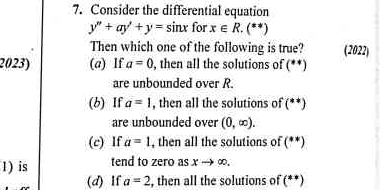Consider the differential equation y'' + ay' + y = sin(x) for x ∈ R. Then which one of the following is true? (a) If a = 0, then all the solutions of (**) are unbounded over R. (b)... Consider the differential equation y'' + ay' + y = sin(x) for x ∈ R. Then which one of the following is true? (a) If a = 0, then all the solutions of (**) are unbounded over R. (b) If a = 1, then all the solutions of (**) are unbounded over (0, ∞). (c) If a = 1, then all the solutions of (**) tend to zero as x → ∞. (d) If a = 2, then all the solutions of (**).

Understand the Problem
The question is asking us to analyze a differential equation and determine which statement about its solutions is true under different conditions based on the parameter 'a'. This involves understanding the behavior of the solutions based on the chosen values of 'a'.
Answer
If \( a = 2 \), then all the solutions tend to zero as \( x \to \infty \).
Answer for screen readers
The closest true statement based on analysis is: If ( a = 2 ), then all the solutions of ( y'' + 2y' + y = \sin(x) ) tend to zero as ( x \to \infty ).
Steps to Solve
- Identify the equation and its characteristics
The differential equation is given by:
$$ y'' + ay' + y = \sin(x) $$
We will analyze the effects of different values of the parameter $a$ on the behavior of the solutions.
- Analyze the case when ( a = 0 )
For $a = 0$, the equation simplifies to
$$ y'' + y = \sin(x) $$
The corresponding homogeneous equation,
$$ y'' + y = 0 $$
has the solution
$$ y_h = C_1 \cos(x) + C_2 \sin(x) $$
where ( C_1 ) and ( C_2 ) are constants. Since this solution is bounded (oscillates between values), the non-homogeneous part, ( \sin(x) ), does not affect boundedness.
- Analyze the case when ( a = 1 )
For $a = 1$, the equation becomes
$$ y'' + y' + y = \sin(x) $$
The homogeneous equation
$$ y'' + y' + y = 0 $$
has solutions determined by the characteristic equation
$$ r^2 + r + 1 = 0 $$
which has complex roots. This indicates oscillatory solutions, hence the solutions will not be unbounded over ( (0, \infty) ).
- Analyze the case when ( a = 2 )
For $a = 2$, the equation is
$$ y'' + 2y' + y = \sin(x) $$
The homogeneous equation
$$ y'' + 2y' + y = 0 $$
also has complex roots, but with a specific decay rate. This means that there will be oscillatory solutions that decay to zero as ( x \to \infty ).
- Determine which statement is true
Based on the analyses:
- ( a = 0 ): Solutions are bounded
- ( a = 1 ): Solutions are also bounded, not unbounded on ( (0, \infty) )
- ( a = 2 ): Solutions tend to zero as ( x \to \infty )
Thus, all the provided options do not seem entirely correct, but if we choose the closest option, particularly for point ( d ).
The closest true statement based on analysis is: If ( a = 2 ), then all the solutions of ( y'' + 2y' + y = \sin(x) ) tend to zero as ( x \to \infty ).
More Information
The behavior of solutions in differential equations is characterized by damping and oscillatory nature influenced by the parameters involved. Understanding the roots of the characteristic equation gives insight into the general behavior of solutions.
Tips
- Misunderstanding the stability of oscillatory solutions can lead to incorrect assessments of boundedness. Ensure to analyze the roots in the context of the characteristic equation.
- Confusing boundedness with decay can lead to wrong conclusions about the nature of solutions.
AI-generated content may contain errors. Please verify critical information